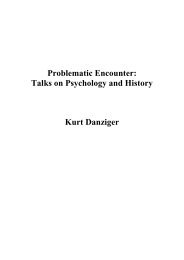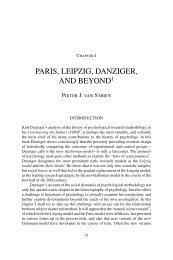The positivist repudiation of Wundt - Kurt Danziger
The positivist repudiation of Wundt - Kurt Danziger
The positivist repudiation of Wundt - Kurt Danziger
You also want an ePaper? Increase the reach of your titles
YUMPU automatically turns print PDFs into web optimized ePapers that Google loves.
THE POSITIVIST REPUDIATION OF WUNDT 213<br />
for setting limits to the experimental method changed from substantive to formal con-<br />
siderations. In the first edition <strong>of</strong> the Logik the realm <strong>of</strong> the psychological experiment<br />
covers the investigation <strong>of</strong> the facts <strong>of</strong> individual consciousness in relation to their coex-<br />
istence and succession, “and never extends beyond this simple task.” 33 Questions about<br />
psychological development and complex psychological processes, as involved, for exam-<br />
ple, in symbolic activity, cannot be answered by means <strong>of</strong> the experimental method.<br />
<strong>The</strong> younger generation <strong>of</strong> psychologists did not share <strong>Wundt</strong>’s skepticism. Eb-<br />
binghaus’s extension <strong>of</strong> the experimental approach to the study <strong>of</strong> mepory clearly gave<br />
expression to and encouraged their faith in the universal applicability <strong>of</strong> experimenta-<br />
tion. In his textbook Kiilpe states: “So that in principle there is no topic <strong>of</strong> psychological<br />
inquiry which cannot be approached by the experimental method. And experimental psy-<br />
chology is therefore fully within its rights when it claims to be the general psychology <strong>of</strong><br />
which we propose to treat.” 34 A few years later these sentiments were to receive a far-<br />
reaching practical expression in the form <strong>of</strong> the experimental work <strong>of</strong> the Wiirzburg<br />
School carried out under Kiilpe’s direction. This work provoked <strong>Wundt</strong> to a direct<br />
counterattack in which he castigated the Wiirzburg attempts at applying the experimen-<br />
tal method to the study <strong>of</strong> complex thought processes as “pseudo-experimentation.” 35<br />
As far as <strong>Wundt</strong> was concerned, such complex psychological processes were beyond the<br />
reach <strong>of</strong> experimentation in the sense in which natural science understood that term. <strong>The</strong><br />
procedures adopted by Kiilpe’s Wurzburg School did not deserve the name <strong>of</strong> experimen-<br />
tation and their results were no more worthy <strong>of</strong> being accepted as a serious contribution<br />
than were the results <strong>of</strong> uncontrolled introspection which to <strong>Wundt</strong> had always been<br />
abhorrent.<br />
This controversy has been noted by some historians <strong>of</strong> psychology, usually in pass-<br />
ing. Its real significance, however, can be appreciated only if we do not regard it as hav-<br />
ing been caused by the phlegm <strong>of</strong> a cantankerous old man, but if we recognize its roots in<br />
the split that had developed between <strong>Wundt</strong> and Kiilpe in the previous decade. <strong>The</strong>ir con-<br />
flict about the limits <strong>of</strong> experimental method in psychology was a direct outcome <strong>of</strong> their<br />
different philosophies <strong>of</strong> science and <strong>of</strong> their definition <strong>of</strong> the scientific scope <strong>of</strong> psy-<br />
chology. If psychology is defined purely as a natural science, then the method <strong>of</strong> ex-<br />
perimentation, characteristic <strong>of</strong> the natural sciences, becomes coextensive with psy-<br />
chology. If, on the other hand, psychology is essentially a Ceisteswissenschaft, albeit one<br />
with certain definite links to the natural sciences, then its use <strong>of</strong> the experimental method<br />
will be regarded as legitimate only as far as these links go, but no farther. In contrast to<br />
this, the <strong>positivist</strong> philosophy made no distinction between two kinds <strong>of</strong> experience, two<br />
kinds <strong>of</strong> knowledge, mediate and immediate. For positivism, all knowledge worthy <strong>of</strong> the<br />
name was <strong>of</strong> the same type and whatever did not conform to this type was fiction, im-<br />
agination, or fantasy. <strong>The</strong> definition <strong>of</strong> this singular kind <strong>of</strong> knowledge was provided by<br />
the data and methods <strong>of</strong> natural science. Among these methods experimentation was<br />
clearly paramount, therefore psychology could aspire to knowledge <strong>of</strong> complex mental<br />
processes only ins<strong>of</strong>ar as it succeeded in subjecting them to experimental investigation.<br />
<strong>The</strong> Widening <strong>of</strong> the Controversy: Dilthey, Ebbinghaus, Titchener<br />
<strong>The</strong> fundamental divergence <strong>of</strong> opinion in regard to the definition, scope, and<br />
methods <strong>of</strong> psychology was not limited to <strong>Wundt</strong> and his most distinguished student. <strong>The</strong><br />
significance <strong>of</strong> the <strong>Wundt</strong>-Kulpe rift can be fully appreciated only if it is seen in the con-<br />
text <strong>of</strong> other contemporary polemics around similar issues. In 1894, the year <strong>of</strong> <strong>Wundt</strong>’s<br />
monograph on “psychic causality” and <strong>of</strong> the first Avenarius paper on the subject matter<br />
<strong>of</strong> psychology, Wilhelm Dilthey published his “Ideas on Descriptive and Analytical





